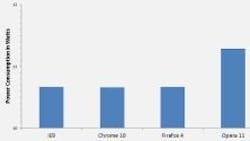How much power does your browser use?
Most of us probably don't give our Web browser a second thought when it comes to the amount of power our computers dissipate. But the folks at Microsoft certainly ponder this stuff. An example of their thinking about the power dissipation of IE9 recently emerged on the IEblog that Microsoft maintains wherein developers talked about how they measure power consumption and share the results from recent engineering tests comparing browser power requirements, and explain how fully hardware accelerating Internet Explorer 9 has improved overall power efficiency.
Microsoft used an instrumented PC to measure the power usage of each PC component, including CPU, GPU, GMCH, Memory, Uncore, Hard Disk, Network, USB and many others. They say individual measurements of this sort are more reliable than measuring overall system power consumption or battery durations which both have higher variance.
Microsoft measured power consumption across six scenarios. They let each scenario run for seven minutes and looked at the average power consumption over that duration. This let them see multiple power cycles and ensure statistically accurate results.
The scenarios they looked at included Windows 7 without any browsers running (for a baseline), navigation of various browsers to about:blank (power consumption of the browser UI), loading one of the world’s most popular news Web sites (common HTML4 scenario), and running the HTML5 Galactic experience (representative of graphical HTML5 scenario).
To gauge how much power the browser UI itself consumed, developers measured each browser navigated to an about:blank page. In this scenario the browsers are not executing any markup and are close to idle, but developers noticed that differences in power consumption began to emerge.
With this scenario most browsers are close to the system idle power usage, meaning they have little impact on power consumption. The exception is Opera 11 which consumes about 5% more power than other browsers when idle. One reason is that Opera changes the system timer resolution from the default 15.6 msec to 2.5 msec which prevents the CPU from entering low-power states.
To understand the power consumption when browsing between Web sites, they measured each browser loading and viewing one of the world’s most popular news sites. To ensure consistent results the news site was cached on the network and each browser loaded an identical copy of the site.
Power consumption in this case for Internet Explorer 9 does not consume significantly more power than the system idle scenarios. Where Internet Explorer 9’s power consumption was relatively stable, Google Chrome 10 power consumption is cyclical with regular power spikes that push GPU and Uncore power consumption to nearly 3 W for those components.
When developers looked at Firefox 4 they saw a stable pattern consistent with Internet Explorer 9. Low and steady consumption is more efficient than cyclical and high power spikes, and both Firefox 4 and Internet Explorer 9 do well against this objective, they say.
More info can be found on the IEblog entry. Comments at the end are also interesting: http://blogs.msdn.com/b/ie/archive/2011/03/28/browser-power-consumption-leading-the-industry-with-internet-explorer-9.aspx
